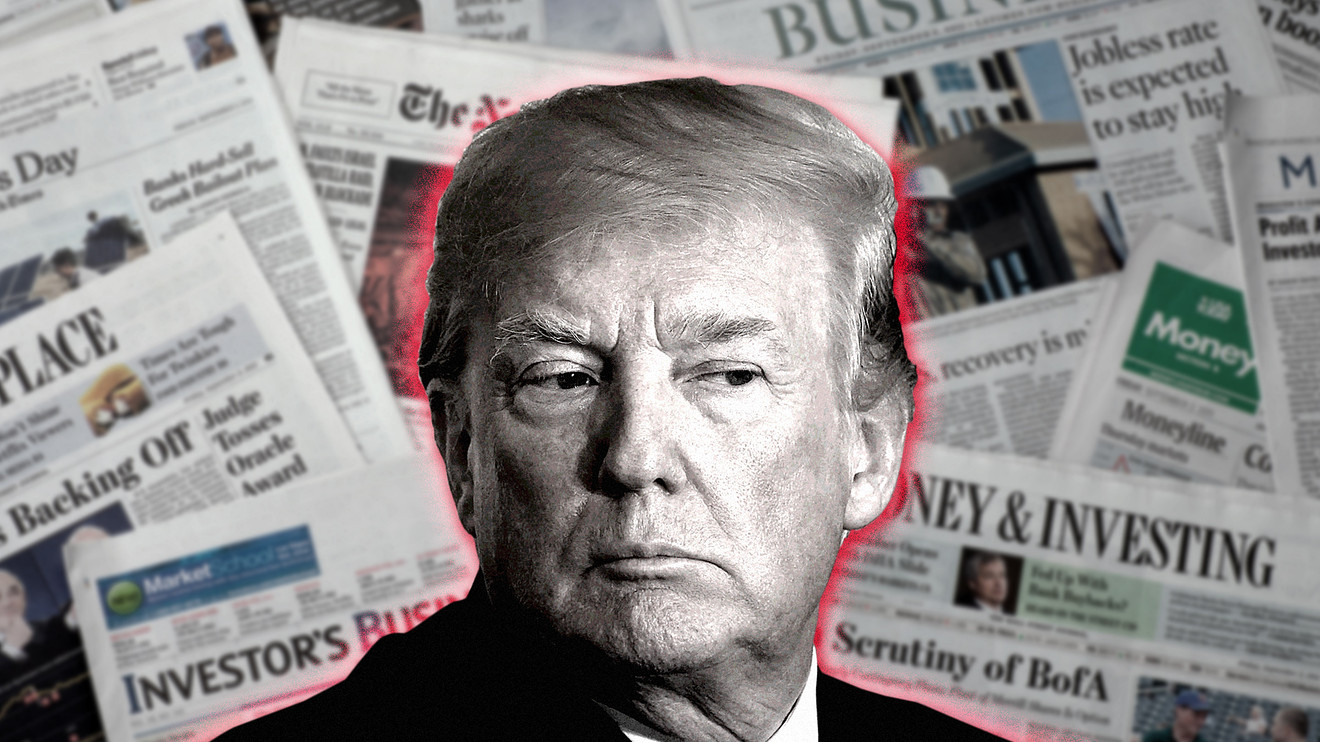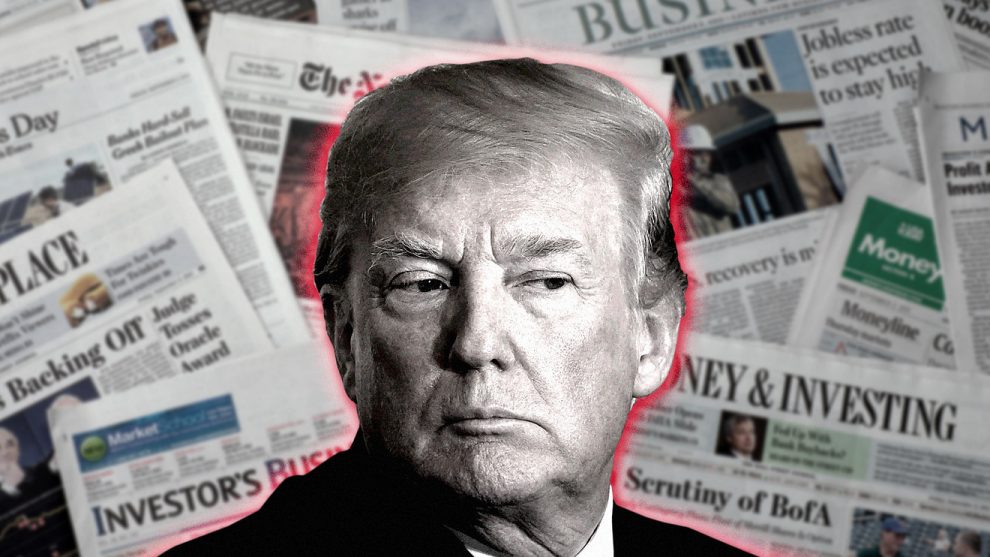
President Trump wants to talk about social-media bias.
Social media doesn’t help people differentiate what is real from what is fake, but “fake news” has been used by social scientists to describe fictional articles online and, famously, by President Trump, who uses it as a cudgel against mainstream media. Facebook FB, -0.48%, meanwhile, struggles to stem the flow of fake news and erroneous memes, and Chief Executive Mark Zuckerberg has said the world’s biggest social-media site is making progress in dealing with the problem.
Trump’s relationship with the traditional media has been acrimonious from the moment he embarked on his campaign for president. Since then he has not only labeled as “fake” news outlets that have reported critically on his administration, but he has also described CNN T, +1.01%, NBC CMCSA, +0.04%, ABC DIS, +1.01%, CBS CBS, +0.91% and the New York Times NYT, +2.19% as “the enemy of the American people.”
Earlier this month, Trump hosted a “Social Media Summit” with some of the most influential people in the conservative and right-wing media. The Claremont Institute think tank, media company Prager University and the Media Research Center, the Heritage Foundation, Bill Mitchell, a radio host who has tweeted about the QAnon conspiracy theory, and at least one alt-right activist who said Senator Kamala Harris is not “American Black.” Facebook, Google and Twitter were not invited.
Some 18% of Facebook users who share fake stories were both self-identified Republicans and over the age of 65, a Princeton University study concluded.
The good news for the 2.38 billion people who use Facebook: Most Facebook users did not share any fake news articles during the 2016 U.S. presidential campaign, according to a recent study but the small number who did were mostly Republican Americans over the age of 65. The findings suggest the need for “renewed attention” to educate “particular vulnerable individuals,” such as aging baby boomers, about fake news or misleading information that appears to resemble a fact-checked news article published by a legitimate and fact-based media outlet, researchers said.
So why are Republican baby boomers more likely to share fake news on Facebook? One theory: As they didn’t grow up with technology, they may be more susceptible to being fooled. (Case in point: the variety of scams that have had success with older Americans by preying on their lack of familiarity with how computers and technology work.)
Don’t miss: Political-communication scholar has a catchy new name for fake news: V.D.
Younger Americans who grew up with the internet, regardless of their political leanings, tend to be less overwhelmed by stories that cross their news feeds on Facebook and Twitter TWTR, +8.92% and more adept at spotting telltale signs of fake news. “Because of technology, we are inundated by information,” Steven Sloman, professor of cognitive, linguistic and psychological sciences at Brown University, told NPR last year. “We just don’t have time to separate the facts from the falsities. Even fact checkers don’t have time. A message can go viral before any serious truth filter has been applied. This leads to a positive feedback cycle.”
‘Because of technology, we are inundated by information. We just don’t have time to separate the facts from the falsities.’
To shed light on the issue in the latest study of which users were more likely to share misleading facts on Facebook during the 2016 presidential election, Andrew Guess, an associate professor at Princeton University, and his colleagues disseminated an online survey to 3,500 people in three waves throughout the 2016 campaign. Of the respondents, 1,331 in the initial wave agreed to share their Facebook profile data, which allowed researchers to analyze the age and political affiliations of those people who were more likely to spread fake news.
The results showed that 90% of these users actually did not share misleading or fake articles and only 8.5% shared one or more fake news articles. A plurality, 18%, of the Facebook users who shared the fake stories were both self-identified Republicans and over the age of 65, the authors concluded, and these individuals shared nearly seven times as many fake news articles as respondents in the youngest age group, ranging in age from 18 to 29.
Studies say boomers are likely to be conservative and ideological
Another possible explanation: Older Americans may have felt particularly passionate and entrenched in their political views and, therefore, ideological. For instance, the most ideological members of Congress shared news stories on their Facebook pages more than twice as often as moderate legislators between Jan. 2, 2015, and July 20, 2017, according to a 2018 Pew Research Center study, which examined all official Facebook posts created by and for members of Congress in this period.
Conservative Republicans made up the largest single partisan and ideological group among boomers, according to the Pew Research Center.
What’s more, baby boomers are more likely to be conservative and ideological, according to data crunched by Pew. “In both 2015 and 2016, about one in 10 baby boomers identified as conservative Republicans — the highest percentages dating back to 2000,” researchers Shiva Maniam and Samantha Smith wrote for Pew. “In both years, conservative Republicans made up the largest single partisan and ideological group among boomers.”
To be fair, older Republicans share more news in general, and fake news gets caught up in the mix. Members of Congress with very conservative or very liberal voting records both shared news links in about 14% of all their posts, but members with more moderate ideology scores shared links to news stories in just 6% of their posts, Pew found. Therefore, ideological individuals could share more stories and, by virtue of sheer volume, spread more fake stories by accident. (Ideology measures were taken from an analysis of congressional roll-call votes compiled by Voteview.com.)
See: How biased is your news source? You probably won’t agree with this chart
There may also be a political explanation: A trickle-down effect from the president’s own remarks about the liberal media. Older Republicans could feel more emboldened by Trump’s comments and, as a result, assume stories that support their causes are accurate. The president has doubled down of late on the view that the mainstream media’s negative coverage of his administration is rooted in bias. “The media also has a responsibility to set a civil tone and to stop the endless hostility and constant negative and often times false attacks and stories,” Trump said last year.
People tend to believe news that jives with their own beliefs
“Confirmation bias” helps outlandish theories and reports gain traction on social media. And that, psychologists say, is where fake news comes in. With so much noise on social media, how can people distinguish between rumor and reality? Psychologists say people develop defense mechanisms to cope with an uncertain world early in life, but this also draws people to information that seems to confirm their own beliefs and world views and to ignore reports or opinions that contradict their perceptions.
Psychologists say people develop defense mechanisms to cope with an uncertain world early in life, but this also draws people to information that seems to confirm their own world views.
“At its core is the need for the brain to receive confirming information that harmonizes with an individual’s existing views and beliefs,” said Mark Whitmore, an assistant professor of management and information systems in Kent State University’s business school. “In fact, one could say the brain is hard-wired to accept, reject, miss-remember or distort information based on whether it is viewed as accepting of or threatening to existing beliefs.”
Whitmore presented a paper at the annual convention of the American Psychological Association in Philadelphia with his wife, Eve Whitmore, a developmental psychologist with Western Reserve Psychological Associates in Stow, Ohio. They said parents teach children to role play and when these kids reach adolescence they should have developed critical thinking skills that help them distinguish between what is true and false, especially when they read news on social media.
Older Americans may be less likely to question authority
However, many people effectively rationalize the irrational in order to avoid going against values and ideas they were taught by their parents. “Children’s learning about make-believe and mastery becomes the basis for more complex forms of self-deception and illusion into adulthood,” Eve Whitmore said. When people are faced with absurd and conflicting messages, her husband added, “It becomes easier to cling to a simple fiction than a complicated reality.”
‘Research on child development says that children that are raised not to question figures of authority, such as parents, teachers, etc. grow up to be adults with similar habits.’
Ideological thinking can go back to how we are taught as children. “Research on child development says that children that are raised not to question figures of authority, such as parents, teachers, etc. grow up to be adults with similar habits,” Mark Whitmore adds. “Likewise, children that are taught to accept things as true in the absence of facts are more likely to believe in things as adults that have no factual bases, conspiracy theories, UFOs, literal translation of religion, etc.”
He also cites “sensory priming,” which is how we teach people to learn. “If you prime people based on their party identification, they will engage in more confirmatory biased way of thinking,” he says. “If you prime people to evaluate something based on its performance, such as a piece of legislature, and they are motivated to discover the truth they will more likely attend to the facts of a situation rather than seek to confirm pre-existing beliefs.”
Read on: Alexandria Ocasio-Cortez slams Daily Caller for misleading fake nude headline
Ultimately, however, it may come down to our trust in the internet, rather than institutions or belief systems. “People who have grown up with the internet have experienced things that are not necessarily truthful. They have had experiences on social media or they have witnessed friends dealing with false information, which has made them more skeptical about what they read versus the baby boomers who did not grow up with the internet and have, therefore, limited experience.”












